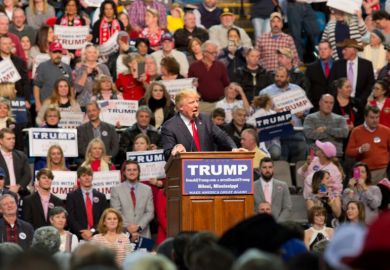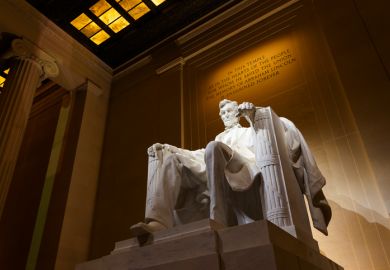Less than two weeks after his inauguration, the US president has already threatened one of the world’s leading universities with removal of federal funds over its perceived failure to ensure the free speech of one of his prominent supporters.
Mr Trump’s attack on the University of California, Berkeley came amid deepening concern in the US science community about the new administration’s attitudes to climate change and science. A March for Science will take place in Washington DC on 22 April, with a mission statement that calls on “political leaders and policy makers to enact evidence-based policies in the public interest”.
With 48 university presidents having signed an open letter to Mr Trump opposing his temporary “travel ban” on entry to the US for nationals of seven Muslim-majority nations, there is already a sense that many in US higher education and science feel that their values are fundamentally under threat from the new administration.
Mr Trump’s attack on Berkeley came after it cancelled on 1 February a scheduled talk by right-wing provocateur Milo Yiannopoulos, an editor at the Breitbart news website, a key vehicle of support for the president.
Mr Yiannopoulos had been invited to speak by Berkeley College Republicans, but the talk was cancelled shortly before it was scheduled to go ahead after serious unrest on campus.
Berkeley said in a 1 February statement that “about 150 masked agitators...came onto campus and interrupted an otherwise non-violent protest”, adding the decision to cancel the talk was made to ensure the safety of the speaker, attendees and lawful protesters.
Mr Trump tweeted on 2 February: “If U.C. Berkeley does not allow free speech and practices violence on innocent people with a different point of view – NO FEDERAL FUNDS?”
Berkeley is a California state university, but receives federal research grants and federal student aid.
Martha Kanter, who was Barack Obama’s lead on higher education as under secretary in the Department of Education, said Mr Trump’s “threat to curb U.C. Berkeley’s federal funds is a prime example of the government overreach that the president vowed to halt. Further, this is not an area where the president has the authority to act.”
She added that colleges’ eligibility for students to receive federal aid is “defined by the terms of the Higher Education Act. Any attempt to limit [an institution’s] eligibility would have to be grounded in a violation of programme rules and is subject to a formal process including judicial review.”
Mr Yiannopoulos, who has spoken at a number of US campuses as part of a book tour, followed up on Mr Trump’s tweet by telling Business Insider: “American universities should be on notice. The president is watching. The days you could silence conservative and libertarian voices on campus and still expect to collect their tax money are coming to an end.”
John Aubrey Douglass, senior research fellow at Berkeley’s Center for Studies in Higher Education, said the cancellation of the talk was “unfortunate at the home of the Free Speech Movement” (a 1960s student protest), but was “not the fault of university faculty or administrators”.
He added: “Since federal financial aid goes directly to students, and federally funded academic research [grants are] distributed largely via a peer review process, one might assume that Berkeley could not and should not be singled out by the Trump administration.
“But these are uncertain times and retribution seems to be a significant pattern in the new administration’s behaviour.”
Mr Trump, whose statements on climate change have ranged from calling it a “hoax” to saying that “nobody really knows” if it is happening, has angered many scientists with his stance on the federal government’s Environmental Protection Agency. Although a freeze on EPA grants imposed by the new administration has now been lifted, there has been speculation that Mr Trump may seek to follow through on his campaign pledge to abolish the agency.
Michael Eisen, a Berkeley geneticist who co-founded the open access Public Library of Science journals, has announced that he plans to run for the US Senate to oppose the new administration’s “basic rejection of the fundamental principles upon which science is based”.
But some warn against the politicisation of science. One scientist wrote in a recent New York Times opinion piece that the March for Science was a “terrible idea” and would “reinforce the narrative from skeptical conservatives that scientists are an interest group and politicise their data, research and findings for their own ends”.
Many others reject that argument. Zen Faulkes, a professor in the department of biology at the University of Texas Rio Grande Valley, wrote on his blog: “When a wrecking ball is swinging towards you, you don’t try to gently nudge it out of the way. This is shaping up as a fight for survival for science in the United States.”
Asked what signal the Trump administration had sent out with its hostility to the EPA, Professor Faulkes replied: “The signal I see is, ‘Don’t contradict the administration.’ Once facts don’t matter, you’re in uncharted territory.”
Register to continue
Why register?
- Registration is free and only takes a moment
- Once registered, you can read 3 articles a month
- Sign up for our newsletter
Subscribe
Or subscribe for unlimited access to:
- Unlimited access to news, views, insights & reviews
- Digital editions
- Digital access to THE’s university and college rankings analysis
Already registered or a current subscriber?








